
Photo Credit: Pinterest
It is general knowledge that weddings are a beautiful thing, more so as they symbolize the beginning of a sacred union between man and wife. Little wonder that people spend so many resources to try to make this symbolism a sacred one.
Being a cultural feature, Nigerians have subconsciously drawn a distinct line that separates the two types of wedding that, to us, makes the wedding process complete: the traditional and the white wedding.
But do we know the origin of the white wedding that we place so much emphasis on?
This emphasis sometimes even clouds the importance of our very own traditional weddings. What, in the annals of history, began the white wedding tradition?
What began the white wedding tradition can be understood from two angles: colour and religion.
First, the white wedding tradition got its name from the white dressing dress that adorns the body, and face, of the bride. Strangely, before and up to 16th century Britain, the white dress was a mourning attire. Of course, it is only natural that many brides did not want to be associated with grief on their special day.
Also, white was reserved for formally sombre court occasions. Even at that, the dread of having to wear that particular colour lingered.
At that time, red and blue (and a variety of other colours like yellow, brown, and grey) were more common colours that brides used for their dresses. White was, more or less, mortifying for a wedding.
This trend remained until, in 1559, the Queen of Scotland, Mary, defied the norm and wore white for her wedding to her intended, Francis Dauphin of France. This defiance was further popularised by Queen Victoria later on in the 19th century in her wedding to Prince Alberta.
Slowly, but steadily, the trend of wearing white stayed on. Brides saw that it was not as bad as advertised. And, since important personages set the pace, it looked safe to follow. Not so surprisingly, the name- white wedding- was simply derived from the colour associated with it.
Second, the Anglican Church is responsible for the theatrics that we see in a typical white wedding- the procession down the aisle, the position of the groom and the bride at the altar, the inclusion of bridesmaids and groomsmen etc.
Weddings are a true celebration of love and the beginning of an entwined journey through life. But the importance placed on a white wedding is not half as sacred as we imagine it to be. It, after all, rests in a choice of colour and the whims of a religion.
